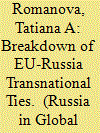| Srl | Item |
| 1 |
ID:
186776


|
|
|
|
|
| Summary/Abstract |
The article aims to explore the causes and consequences of the profound
change in transnational ties between Russia and the European Union after
February 24, 2022, that is, contacts that bypass official authorities and
directly involve Russian and EU citizens (in business, science, education,
culture, sports, and non-governmental organizations’ activities). The
breakdown of ties is unique in speed and scale. Five causes of the breakdown
of transnational ties have been identified: the position of EU officials
towards Russian society; the rise of the war paradigm in the West and its
pluralization (that is, its implementation on different tracks); reputational aspects; the perception of Russian society as homogeneous in supporting
the operation in Ukraine; and pressure from Ukraine itself. As a result,
relations between Russia and the EU have become more politicized and
have lost the potential for resilience and mutual socialization. By limiting
transnational ties, EU players help Russia’s ruling elite consolidate society
and limit alternative thinking; they also change the vector of EU civilian
power. At the same time, the rupture of transnational ties delivers a major
blow to the universality of Western institutions, which will determine the
pace of recovery both for Russian supporters of close relations with the West
and for their opponents. The article also pinpoints certain mechanisms for
rebuilding transnational ties in the medium term.
|
|
|
|
|
|
|
|
|
|
|
|
|
|
|
|
| 2 |
ID:
171842


|
|
|
|
|
| Summary/Abstract |
Although globalization and international migration have increased personal connections across national borders, we know little about how these connections affect attitudes toward foreign policy. This study examines how transnational ties affect support for foreign aid in donor countries. It argues that transnational ties increase support for foreign aid via two mechanisms: group interests and cosmopolitanism. An original survey experiment embedded in a national survey of one thousand Latino Americans shows that Latinos vary significantly in the strength of their transnational ties, which is strongly correlated with support for foreign aid. The findings from the experiment, which varies the location of an American foreign aid program, demonstrate that, although group interests explain some of this effect, cosmopolitanism is also an important mechanism. Indeed, Latinos with transnational ties equally support aid to Africa and Latin America. A test of the generalizability of the findings to other racial and ethnic groups in the United States and United Kingdom reveal that group interests may be a more powerful mechanism outside of the Latino American community. This study encourages further work on the relationship between transnational ties and foreign policy attitudes and provides insight into the emerging link between international migration and foreign aid.
|
|
|
|
|
|
|
|
|
|
|
|
|
|
|
|